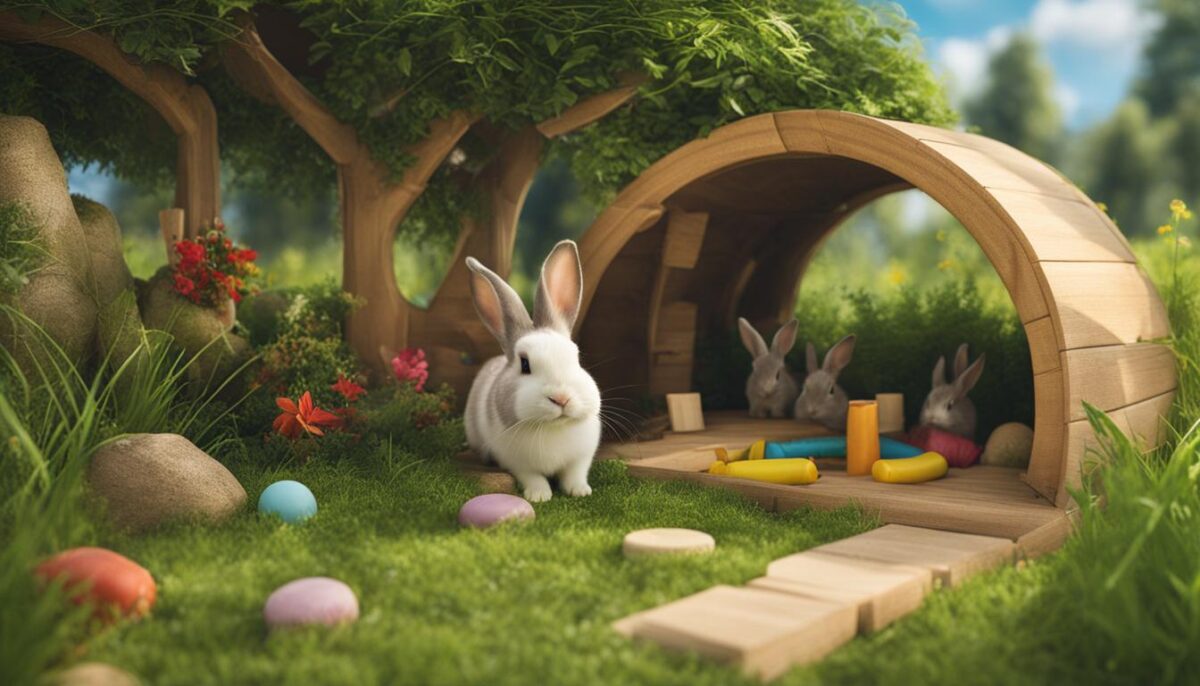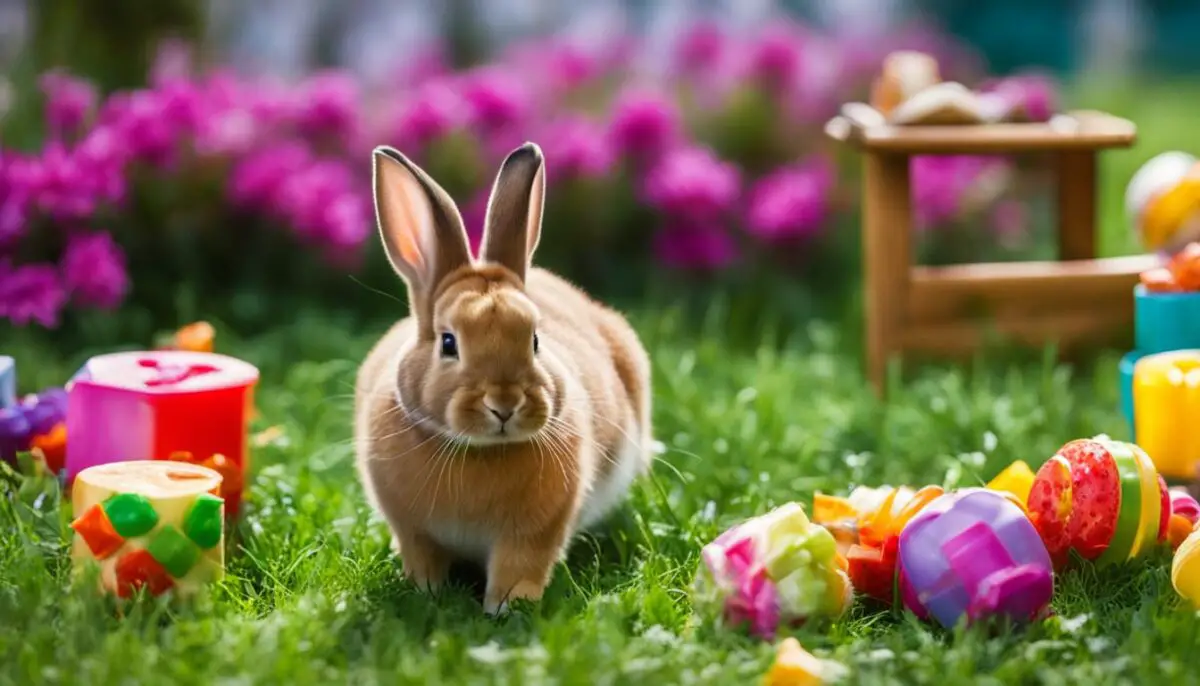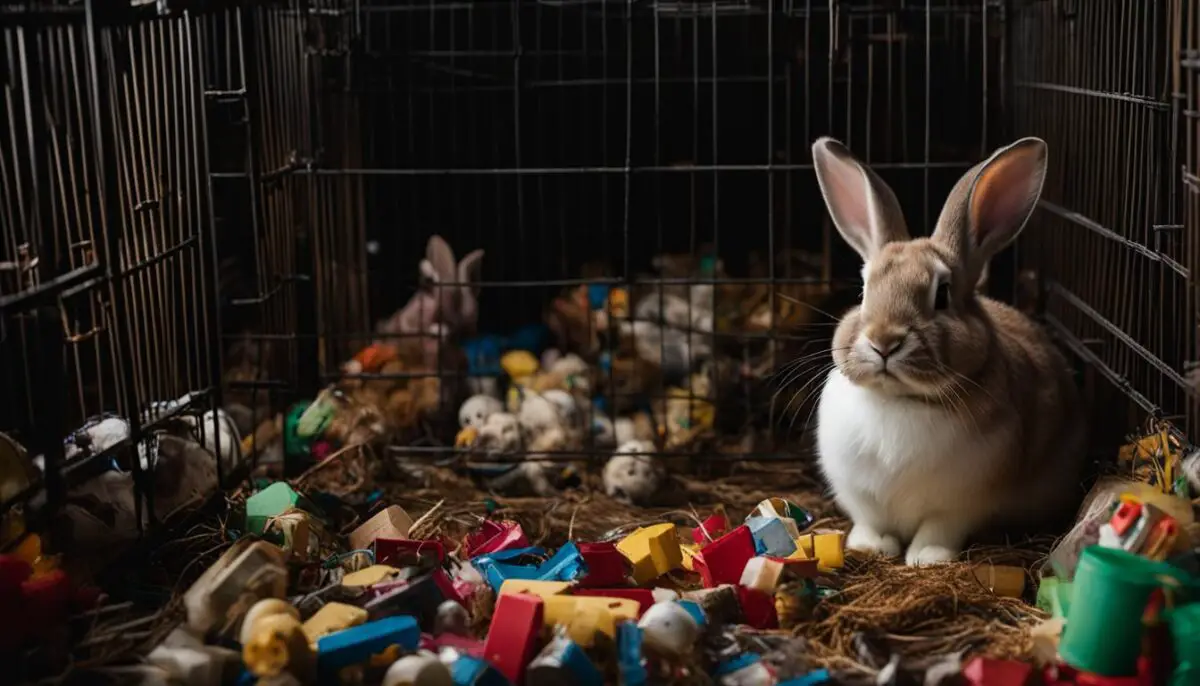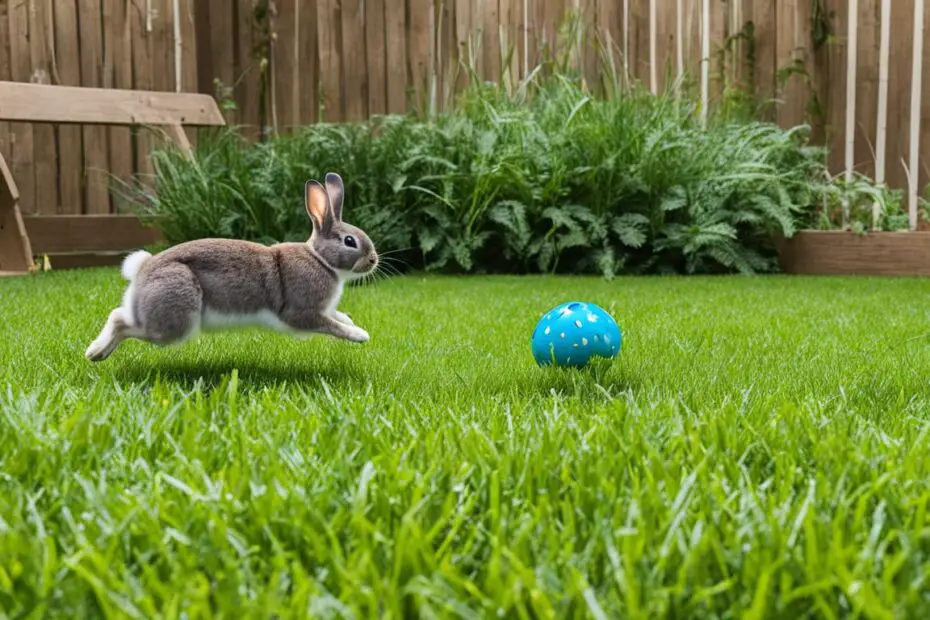Rabbits are social, active animals that require time outside of their cages to thrive both physically and mentally. Providing them with sufficient playtime is essential for their well-being and happiness. But how much time do rabbits actually need out of their cage?
Experts recommend providing rabbits with up to 4 hours of supervised playtime daily. This ensures that they get enough exercise, mental stimulation, and interaction with their owners. Regular playtime is crucial for preventing health issues and promoting a healthy lifestyle for rabbits.
Lack of playtime can lead to depression and poor health in rabbits. It’s important to recognize the signs that your rabbit is not getting enough playtime, such as restlessness and cage protectiveness. By understanding their exercise requirements and providing adequate playtime, you can ensure that your rabbit lives a happy and fulfilling life.
Key Takeaways:
- Rabbits require up to 4 hours of supervised playtime daily
- Regular playtime prevents health issues and promotes a healthy lifestyle
- Lack of playtime can lead to depression and poor health in rabbits
- Recognize the signs that your rabbit is not getting enough playtime
- Understanding their exercise requirements is crucial for their well-being
Setting Up a Play Area for your Rabbit
When it comes to creating a safe play space for your rabbit, you don’t need a large area initially. Start with one room and gradually allow your bunny to explore more areas of your home as they become comfortable and familiar with the initial space.
However, it’s crucial to bunny-proof the play area to ensure your rabbit’s safety. Keep electrical cords out of reach and remove any small objects that your rabbit could chew on or swallow. These preventive measures will help prevent accidents and potential harm to your furry friend.
Engaging toys play a significant role in enhancing your rabbit’s playtime experience. Consider providing ramps, hay buckets, and cardboard tunnels to keep them entertained and stimulated. These toys will keep your rabbit mentally engaged and physically active during play sessions.

Creating a Play Area Checklist:
- Bunny-proof the play area by removing potential hazards.
- Keep electrical cords out of reach.
- Provide engaging toys like ramps, hay buckets, and cardboard tunnels.
Benefits of a Safe Play Area:
“A well-designed play area allows your rabbit to explore, exercise, and engage in natural behaviors while minimizing the risk of accidents or injuries.” – Dr. Jessica Adams, Small Animal Veterinarian
| Benefits | Preventive Measures |
|---|---|
| Physical exercise | Provide ramps and toys for playtime. |
| Mental stimulation | Offer cardboard tunnels and puzzles. |
| Prevention of accidents | Bunny-proof the play area and remove hazards. |
Outdoor Playtime Considerations for Rabbits
Outdoor playtime can be a wonderful experience for rabbits, allowing them to explore their surroundings and engage in natural behaviors. However, it’s important to be aware of the risks involved and take necessary precautions to ensure the safety of your furry friend.
Rabbits are vulnerable to various dangers when they are outdoors. Here are some key considerations to keep in mind:
- Protection from predators: Rabbits are prey animals, and they attract the attention of predators such as dogs, cats, birds of prey, and even wild animals. It’s crucial to provide a securely enclosed space for outdoor playtime to minimize the risk of attacks.
- Avoid toxic plants: Some plants are toxic to rabbits if ingested. Before allowing your rabbit to play outside, ensure that the play area is free from any poisonous plants. This includes popular garden plants like lilies, azaleas, and daffodils.
- Pesticide exposure: Pesticides and insecticides used in gardens can be harmful to rabbits. Avoid letting your rabbit play in areas that have been treated with chemicals or choose organic gardening practices to minimize exposure.
- Securing the play area: It’s essential to have a securely enclosed playpen, an enclosed porch, or a balcony to prevent your rabbit from wandering off, getting lost, or encountering potential hazards like traffic.
Remember, outdoor playtime for rabbits should always be supervised. Don’t leave your rabbit unattended, as they can quickly find themselves in dangerous situations.
Creating a safe and enjoyable outdoor environment for your rabbit is crucial for their physical and mental well-being. By taking the necessary precautions and being vigilant during outdoor playtime, you can provide a stimulating and secure experience for your furry companion.
| Risks of Outdoor Playtime for Rabbits | |
|---|---|
| Risks | Precautions |
| Predator attacks | Use a securely enclosed playpen or area |
| Toxic plant ingestion | Ensure the play area is free from toxic plants |
| Exposure to pesticides | Avoid treated areas or use organic gardening practices |
| Escape or road accidents | Secure the play area to prevent wandering off |
Remember, safety should always be the top priority when it comes to outdoor playtime for your rabbit. So, enjoy the time outside with your furry friend, knowing that you have taken all the necessary precautions to ensure their well-being.

How Long Should Rabbits Be Out of Their Cage?
The recommended duration of rabbit playtime varies among experts, but most agree that a minimum of one to two hours per day is essential. Younger rabbits may require longer play sessions, while older rabbits may be content with shorter sessions. It’s important to note that rabbits are most active in the early morning and early evening, but they can adapt to your schedule over time. Regular play sessions are crucial for a rabbit’s mental and physical well-being, as it helps prevent obesity and cardiovascular disease.
The Optimal Duration for Rabbit Playtime
While there is no hard and fast rule for the duration of rabbit playtime, it is recommended to aim for at least one to two hours daily. This allows your bunny to engage in physical exercise, explore their surroundings, and interact with you. Be observant of your rabbit’s behavior during playtime to determine if they need more or less time outside of their cage.
If you’re unsure about the optimal duration for your rabbit’s playtime, consult with your veterinarian. They can provide personalized recommendations based on your rabbit’s age, breed, and overall health.
Benefits of Regular Rabbit Play Sessions
Regular play sessions offer numerous benefits for both the mental and physical well-being of rabbits. They provide essential exercise to keep your rabbit fit and prevent obesity-related health issues. Additionally, playtime stimulates their natural instincts and mental acuity, preventing boredom and negative behaviors such as chewing on objects or digging in unwanted areas.
Engaging in play and interaction with your rabbit also strengthens the bond between you and your pet. It enhances their trust in you and promotes a more loving and social relationship.
An Example of a Playtime Schedule
Here’s an example of how a playtime schedule could look:
| Time | Activity |
|---|---|
| 7:00 AM | Playtime session 1: Let your rabbit explore a designated play area with toys and tunnels. |
| 12:00 PM | Quiet time: Allow your rabbit to rest and relax in their cage. |
| 4:00 PM | Playtime session 2: Provide interactive toys and engage in interactive play with your rabbit. |
Remember that this is just an example, and you can adjust the schedule to fit your lifestyle and your rabbit’s preferences. The key is to maintain regularity and consistency in providing playtime for your furry friend.

The Effects of Insufficient Playtime on Rabbits
When rabbits do not get enough playtime, it can have significant consequences on their physical and mental well-being. Lack of playtime can lead to a range of issues, including poor mental health and cage protectiveness.
Mental Health of Rabbits
Rabbits are social animals that thrive on companionship and mental stimulation. Regular playtime provides them with the necessary mental exercise, preventing boredom and the development of behavioral issues. When rabbits lack playtime, they may become depressed or anxious, exhibiting signs of dissatisfaction and reluctance to return to their cages.
Cage Protectiveness in Rabbits
Rabbits that are deprived of playtime may become excessively territorial and protective of their cages. They may display aggressive behavior, attacking when approached or trying to defend their limited space. This cage protectiveness is a clear indication of their frustration and dissatisfaction due to lack of playtime.
| Consequences of Lack of Rabbit Playtime | |
|---|---|
| Weight Gain | Lack of exercise can lead to weight gain in rabbits, making them more prone to obesity-related health issues. |
| Cardiovascular Issues | Insufficient physical activity can contribute to cardiovascular problems, such as heart disease, in rabbits. |
| Poor Health | Rabbits that do not receive enough playtime are at risk of overall poor health, including weakened immune systems and decreased lifespan. |
Recognizing the signals that your rabbit is not getting enough playtime is crucial. If you observe signs of depression, cage protectiveness, or weight gain, it’s essential to make adjustments to ensure their well-being. Prioritizing regular and adequate playtime for your rabbit will contribute to their mental and physical health, helping them live a happy and fulfilling life.

Supervising Rabbit Playtime and the Importance of Interaction
Supervision is essential during rabbit playtime to ensure their safety and well-being. Leaving them unsupervised can lead to potential accidents or harm. Furthermore, playing with and interacting with your rabbit is not only enjoyable but also vital for fostering a strong bond between you and your furry friend.
During playtime, take the opportunity to provide mental stimulation for your rabbit. Engaging in interactive activities, such as gentle chasing or playing with toys, keeps their minds active and prevents boredom. Rabbits, like humans, need mental stimulation to thrive and avoid feelings of loneliness or sadness.
Interaction during rabbit playtime:
- Speak to your rabbit in a soothing voice to provide comfort and reassurance.
- Stroke them gently to show affection and establish trust.
- Offer treats as rewards for positive behavior, encouraging positive associations with playtime.
Remember, rabbits are social animals and enjoy the company of their owners. Taking the time to play and interact with them strengthens your bond, making them feel loved and cared for. It’s a wonderful opportunity for both of you to enjoy each other’s company.
While outdoor playtime can be tempting, it’s crucial to avoid setting your rabbit loose in the yard without proper supervision. The risk of escape or falling victim to predators is high. Always prioritize the safety and well-being of your furry companion.
Playtime tables or schedules:
| Age of Rabbit | Recommended Playtime Duration |
|---|---|
| Up to 4 months | 1-2 hours twice a day |
| 4-6 months | 2-3 hours twice a day |
| 6 months and older | 1-2 hours once or twice a day |
Remember, these are general guidelines, and it’s essential to assess your rabbit’s behavior and energy levels to determine their individual needs. Some rabbits may require more or less playtime depending on their personality and activity levels.
To conclude, supervised playtime allows you to provide both physical and mental stimulation for your rabbit, enhancing their overall well-being. Additionally, the bond formed through interaction during playtime is invaluable. Enjoy this special time together and watch your rabbit thrive!
Conclusion
Ensuring the well-being of your rabbit relies on maintaining a healthy balance of playtime. By providing your rabbit with the recommended playtime duration, a safe play area, and supervised interaction, you can contribute to their overall physical and mental health.
Regular play sessions are not only essential for preventing obesity and cardiovascular disease in rabbits but also for allowing them to engage in natural behaviors and stimulate their minds. It is through playtime that rabbits can explore, exercise, and interact with their environment, which is vital for their overall well-being.
Understanding your rabbit’s needs and providing the necessary playtime will help create a happy and fulfilling life for your furry friend. Remember to always keep a watchful eye and offer a rabbit-proofed space for them to play, ensuring their safety and enjoyment.
FAQ
How much time do rabbits need out of their cage?
Rabbits require ample time outside of their cages to stay healthy and happy. Experts recommend providing them with up to 4 hours of supervised playtime daily.
How should I set up a play area for my rabbit?
When setting up a play area for your rabbit, it doesn’t have to be very large initially. One room is sufficient, and you can gradually allow your bunny to explore more areas of your home once they become comfortable and familiar with the initial space. However, it’s crucial to bunny-proof the play area to ensure their safety.
Can I let my rabbit play outdoors?
Outdoor playtime for rabbits requires careful consideration. It’s important to protect rabbits from predators, toxic plants, pesticides, and moving vehicles. If you choose to allow them outdoor playtime, make sure it is in a securely enclosed space and always supervise them.
How long should rabbits be out of their cage?
The recommended duration of rabbit playtime varies among experts, but most agree that a minimum of one to two hours per day is essential. Younger rabbits may require longer play sessions, while older rabbits may be content with shorter sessions.
What are the effects of insufficient playtime on rabbits?
When rabbits do not get enough playtime, they may exhibit signs of dissatisfaction and reluctance to return to their cages. Insufficient playtime can also lead to weight gain, cardiovascular issues, and overall poor health.
Do I need to supervise rabbit playtime?
Supervision is essential during rabbit playtime as they should not be left unsupervised. Playing with and interacting with your rabbit enhances the bond between you and provides mental stimulation for the rabbit. Avoid setting your rabbit loose in the yard without proper supervision.
What is the importance of interaction during rabbit playtime?
Supervised interaction during rabbit playtime is crucial for their well-being. Rabbits enjoy the company of their owners and need this interaction to thrive. Regular play sessions help prevent obesity and cardiovascular disease.


